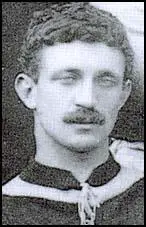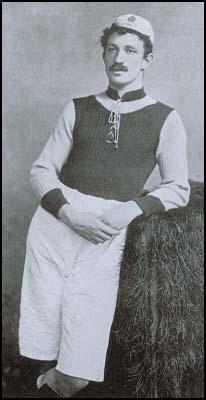Charlie Athersmith

William (Charlie) Athersmith was born in Bloxwich, Staffordshire, on 10th May 1872. He played for several local teams before joining Aston Villa in February 1891. Athersmith had a great start scoring a hat-trick on his debut against local rivals, Wolverhampton Wanderers.
In the 1891-92 season Aston Villa finished in 4th place to Sunderland. Villa's new striker, John Devey, had a great season ending up as top scorer with 29 goals in 25 games. Athersmith scored 11 goals in 24 games that season.
Athersmith won his first international cap for England against Ireland on 5th March, 1892. The England team included John Devey, Dennis Hodgetts and Johnny Holt. England won the game 2-0.
Aston Villa also had a good run in the FA Cup beating Heanor Town (4-1), Darwen (2-0), Wolverhampton Wanderers (3-1) and Sunderland (4-1) to reach the final against West Bromwich Albion.
In his book, Association Football in Victorian England, Philip Gibbons argues that: "Villa dominated the early proceedings, with Athersmith and John Devey exerting pressure on the Albion fullbacks. However, the West Bromwich side soon responded as Billy Bassett passed to Roddy McLeod, who crossed the ball to the waiting Geddes. He shot towards the Villa goal and Warner failed to collect the ball clearly. It rolled between the Villa goalposts to secure a surprising one-goal lead for the Albion team."
Billy Bassett was also involved in WBA's second goal. He won the ball on the halfway line and after running at the Aston Villa defence he passed to Alf Geddes. His shot was saved but the goalkeeper could not hold onto the ball and Sammy Nicholls had the simple task of scoring from the rebound. Jack Reynolds scored the third with a shot from 25-yards.
Aston Villa finished in 4th place in the 1892-93 season. Athersmith finished with 10 goals in 26 games and was second top scorer after John Devey. According to Adam Ward and Jeremy Griffin, the authors of The Essential Aston Villa: "Charlie Athersmith is arguably the fastest player ever to have played for Aston Villa. His speed was legendary, and the Bloxwich-born winner formed a formidable right-flank partnership with John Devey."
Aston Villa also had a good run in the FA Cup beating Heanor Town (4-1), Darwen (2-0), Wolverhampton Wanderers (3-1) and Sunderland (4-1) to reach the final against West Bromwich Albion. In his book, Association Football in Victorian England, Philip Gibbons argues that: "Villa dominated the early proceedings, with Athersmith and John Devey exerting pressure on the Albion fullbacks. However, the West Bromwich side soon responded as Billy Bassett passed to Roddy McLeod, who crossed the ball to the waiting Geddes. He shot towards the Villa goal and Warner failed to collect the ball clearly. It rolled between the Villa goalposts to secure a surprising one-goal lead for the Albion team."
Billy Bassett was also involved in WBA's second goal. He won the ball on the halfway line and after running at the Aston Villa defence he passed to Alf Geddes. His shot was saved but the goalkeeper could not hold onto the ball and Sammy Nicholls had the simple task of scoring from the rebound. Jack Reynolds scored the third with a shot from 25-yards.

Aston Villa won the First Division of the Football League championship in the 1893-94 season. The club scored 84 goals in 30 games. The main contributors included John Devey (20), Dennis Hodgetts (12) and Charlie Athersmith (10). Defenders, James Cowan (centre-half), Jack Reynolds (right-half) and Willie Groves (left-half) were also key members of the team.
In the 1894-95 season Aston Villa finished in 3rd place in the First Division of the Football League. The club scored 82 goals in 30 games. Top scorers were John Devey (19) Stephen Smith (13), Dennis Hodgetts (11), Robert Chatt (10) and Charlie Athersmith (9).
Aston Villa had victories over Derby County (2-1), Newcastle United (7-1), Nottingham Forest (6-2), Sunderland (2-1) to reach the 1895 FA Cup Final against West Bromwich Albion. The Villa outside-left, Robert Chatt, scored the only goal of the game after 39 seconds.
Aston Villa also won the First Division title in 1895-96. For the first time since he joined the club, John Devey was not top scorer. He only scored 16 goals, whereas Johnny Campbell, who had been signed from Celtic, managed to net 26. Other members of these outstanding team included Athersmith, Dennis Hodgetts, James Cowan, John Cowan, Jack Reynolds, Jimmy Crabtree, Howard Spencer and Stephen Smith.
As Philip Gibbons pointed out in Association Football in Victorian England: "Aston Villa had twice won the League Championship, as well as the FA Cup, during the three previous seasons, with a team generally acknowledged as the finest in the land."
Aston Villa retained the title the following season by beating the runners-up, Sheffield United, by an amazing 11 points. Aston Villa scored 73 goals that season with Devey adding 17 to his total. Other contributors included George Wheldon (18), Johnny Campbell (13), Charlie Athersmith (8), John Cowan (7) Stephen Smith (3) and Jack Reynolds (2).
On 30th January, 1897, Aston Villa beat Newcastle United 5-0 in the third round of the FA Cup. They went onto beat Notts County (2-0), Preston North End (3-2) and Liverpool (3-0) to reach the final against Everton. A crowd of 60,000 arrived at Crystal Palace to watch the final. Charlie Athersmith scored the opening goal but Everton hit back with goals from Jack Bell and Richard Boyle. Aston Villa continued to dominate the game and added two more from George Wheldon and Jimmy Crabtree. That finished the scoring and therefore Aston Villa had emulated the great Preston North End side that had achieved the FA Cup and Football League double in 1888-89 season.
Athersmith was in such good form that he was recalled to the England team to play Ireland on 20th February, 1897. The England team that day included Steve Bloomer, Ernest Needham, Tom Bradshaw, Gilbert O. Smith, John Robinson and George Wheldon. England won the game 6-0. He regained his place in the games against Wales (4-0) and Scotland (1-2).
Aston Villa also won the title in the 1898-99 season. Athersmith only scored 4 goals that season but made plenty of chances for fellow forwards John Devey (21), George Wheldon (16) George Johnson (9) and Billy Garraty (6).
Aston Villa confirmed it was the best club in England during the 1890s when it won the First Division championship the following season. This was their fifth league title in seven years. During this period they had also won the FA Cup twice (1895 and 1897). Billy Garraty was the top scorer in league and cup games in the 1899-1900 season with 31 goals. He was followed by John Devey (18), George Wheldon (13), Stephen Smith (7), George Johnson (6) and Charlie Athersmith (4).
Charlie Athersmith won his last international cap for England against Scotland on 7th April, 1900. He scored 3 goals in 12 games for his country.
Athersmith signed for Birmingham City in June 1901. While at Aston Villa he scored 86 goals in 311 appearances. He played in 100 games for Birmingham before joining Grimsby Town as their trainer (May 1908 to May 1909).
Charlie Athersmith died on 18th September 1910.
Primary Sources
(1) Ernest Needham, Association Football (1901)
The speediest forward in England is said to be Athersmith, of Aston Villa, one of the most dangerous men to tackle. Apart from his weakness of rashness at times, he is one of the very best forwards at outside-right. His speed often gets him through where a slower man would have but little chance.
(2) Philip Gibbons, Association Football in Victorian England (2001)
Villa dominated the early proceedings, with Athersmith and John Devey exerting pressure on the Albion fullbacks. However, the West Bromwich side soon responded as Billy Bassett passed to Roddy McLeod, who crossed the ball to the waiting Geddes. He shot towards the Villa goal and Warner failed to collect the ball clearly. It rolled between the Villa goalposts to secure a surprising one-goal lead for the Albion team.
(3) Adam Ward and Jeremy Griffin, The Essential Aston Villa (2002)
Charlie Athersmith is arguably the fastest player ever to have played for Aston Villa. His speed was legendary, and the Bloxwich-born winner formed a formidable right-flank partnership with John Devey.
